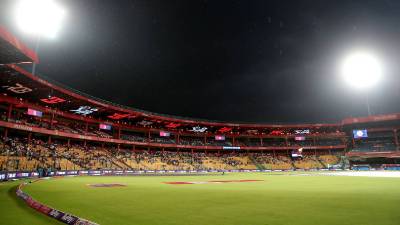Cap spending, risk modernisation
There can be no question that we must cap our Defence spending, especially during periods of high fiscal and budgetary deficits. But, at the...

There can be no question that we must cap our Defence spending, especially during periods of high fiscal and budgetary deficits. But, at the same time, we must look at the realities objectively.
Unlike many other segments of national expenditure, the annual Defence budget must be seen in the long-term context. The public focus on many high-ticket procurement items like the Gorshkov aircraft carrier, the Brahmos missile, or the issue of missile defences has tended to divert our attention from the serious problems in Defence modernisation that have been snowballing in recent years. We had to put modernisation practically on hold since late 1980s due to a number of factors ranging from the Bofors Syndrome to Tehelka.
What inevitably suffered was modernisation, generating a massive backlog that now threatens wide-ranging obsolescence. Fortunately, financial-budgetary management of Defence leaves serious concerns for a country like ours where resources, by definition, must remain scarce. But, with 74 billion reserves, we have created unique records with large unspent funds in Defence for three years running. The current budget shows an unspent amount of Rs 8,685 crore in the current year!
In other words, like the past three years, 13 per cent of the allocations for Defence have remained unspent 8212; or we may call it 8216;8216;economising8217;8217; in cutting Government spending 8212; in spite of the extra expenditure for the year-long mobilisation of Defence forces. The problem is that the actual expenditure may well show an even greater gap.
For example, in 2000-01, we ended the year actually with Rs 8,965 crore not Rs 4,126 crore as reflected in revised estimates unspent from the allocations made at the time of sanctioning the year8217;s budget. What was worrying was that nearly one-third of the capital expenditure which contributes to most of the modernisation process remained unutilised. Since then we have repeated this performance.
But what should worry everyone, except those across our borders, is that we have been surrendering nearly 30 per cent of the budget under the capital modernisation head every year now for three years. Either our planning is persistently poor or our decision-making in the modernisation drive is fundamentally at fault. Two years after top-level 8216;8216;reforms8217;8217; especially in procurement decision-making, this remains unexplained.
Large sums of unspent allocated funds have two major implications. First, it reflects adversely on financial management. Secondly, in our case, it also tends to mask overspending in non-Defence areas distorting conclusions.
But the implications for national defence are even more critical. Four Defence modernisation goals should guide our thinking. First, the level of conventional military capability that we now need in view of nuclear weapons being around has to be significantly higher than what we might have needed in earlier years. Second, superior technology has always influenced the outcome of a war. But this has been assuming an over-riding dimension in recent decades as all the recent wars indicate. Thirdly, force modernisation trends worldwide point towards the drive towards enhancing capabilities to undertake high technology warfare. Fourth, creating and using coercive force for political purposes must be based on long-range strike with escalation dominance and control capabilities.
Strategic and technological logic demands that our capital expenditure should have grown from the current 30-odd per cent of total expenditure to a figure closer to 40 per cent to cater for high-technology systems. Stagnating modernisation goes against all these trends. Spending Rs 65,000-odd crore would start to be infructuous if we cannot ensure that the military is equipped properly to fight and win the next war, if and when it takes place. This would also provide the deterrence needed to ensure that a war does not take place.
|
Budget pro-imperialist, attack on people: CPI-M
|
| NEW DELHI: Dubbing the Budget as a 8216;8216;grievous attack8217;8217; on people8217;s livelihood, the CPI-M today charged the Government with carrying forward its 8216;8216;pro-imperialist8217;8217; agenda through 8216;8216;de-Indianisation8217;8217; of PSUs and banks. The CPI-M Politburo said in a statement here that the Budget provided major fiscal concessions to big businesses and the rich and increased the cost of living for workers and peasants.
WHAT THEY SPOKE CHANDRABABU NAIDU TDP: TDP leader and Andhra Pradesh Chief Minister N. Chandrababu Naidu termed the Budget as 8216;8216;development- and growth-oriented with many welcome features8217;8217; but said the proposal to hike the prices of fertilisers would 8216;8216;adversely affect the farmers particularly in drought situation8217;8217;. He added that the Budget would 8216;8216;boost industrial recovery8217;8217;. Story continues below this ad AMAR SINGH SP: This is a cosmetic budget, a budget designed for the coming elections. It means less business, more politics. It is also a budget for the Page 3 crowd where the price of foreign liquor and cars have been reduced and cost of fertiliser has gone up. S.M. KRISHNA Cong: A smearing salt to the wounds of farmers who have been battered by severe drought. The budget has failed to address the needs of farmers and poor people. It has offered nothing in concrete terms either to the poor or farming community. RABRI DEVI RJD: An anti-poor and pro-rich which will frustrate the common people. The budget has ignored the interests of the poor, middle class and farmers. Cutting of interest rate on small savings by one per cent, additional surcharge of 50 paise on diesel for construction of rural roads, lowering the subsidy on fertilisers will only increase poverty. MAMATA BANERJEE TC: The slash in interest rates on PPF and small savings had belied the expectations of the common people already hit by such decisions earlier. I will raise the issue of fresh cut in interest rates on PPF and small savings which has disappointed common people, during discussion on the budget in the Lok Sabha. Story continues below this ad PALLANI MANIKAM DMK: It is a very ordinary and unremarkable budget. There is nothing favourable nor unfavourable for the people. However, it is clear, the BJP does not want to get down from the driver8217;s seat. |
- 01
- 02
- 03
- 04
- 05































